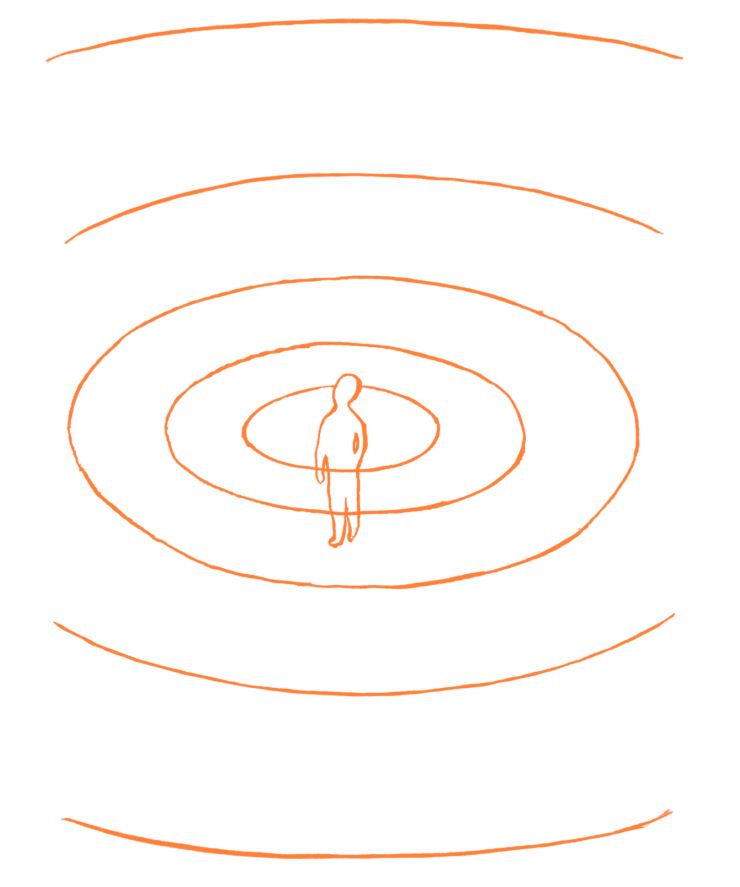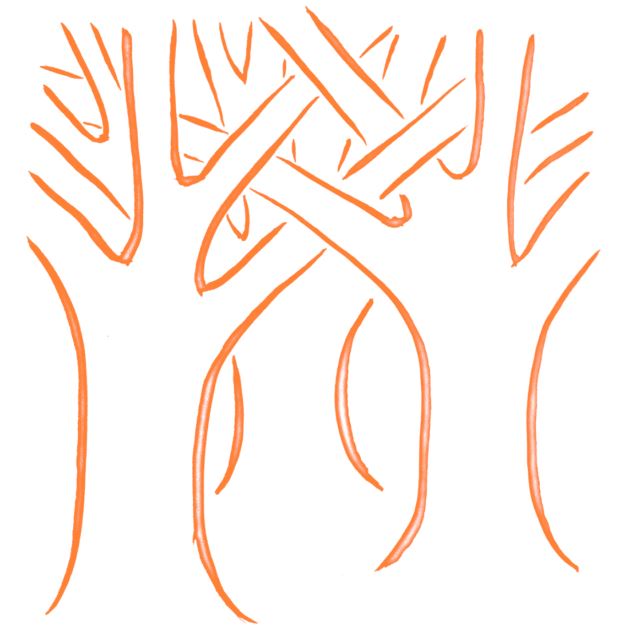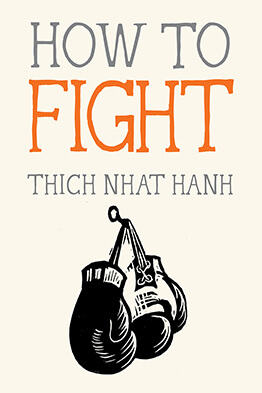Where the fight begins
When someone says something unkind to you, you may want to retaliate right away. That is where the fight begins. This habitual way of reacting creates a well-worn pathway in your brain. When you travel a neural pathway over and over again, it becomes a habit. Very often that pathway leads to anger, fear, or craving. One millisecond is enough for you to arrive at the same destination: anger and a desire to punish the person who has dared to make you suffer. The mind and the brain are plastic in nature. You can change your mind, your brain, and the way you think and feel. With practice, you can create new neural pathways that lead to understanding, compassion, love, and forgiveness. Mindfulness and insight can intervene, redirecting you down a new neural pathway.
A pause
Suppose someone just said something unpleasant to you. Their words and the sound of their voice give you an unpleasant feeling. You believe they are trying to make you suffer. Of course you feel the desire to react, to say something back. You feel that if you can express your anger, if you can make them suffer, you will get relief. Most of us react in that way. But mindfulness can help us pause for a moment and become aware of the anger building up in us. Stopping gives us a chance to acknowledge and to transform our anger. When we feel anger, irritation, or indignation arising in us, we pause. We stop and come back to our breathing straight away. We do not say or do anything when we are inhabited by this kind of energy, so we don’t escalate the conflict. We wait until we’re calm again. Being able to pause is the greatest gift. It gives us the opportunity to bring more love and compassion into the world rather than more anger and suffering.
Don’t fight with anger
Any peace talks should begin with making peace with ourselves. First we need to recognize our anger, embrace it, and make peace with it. You don’t fight your anger, because your anger is you. Your anger is the wounded child in you. Why should you fight your anger? The method is entirely nonviolent: awareness, mindfulness, and tenderly holding your anger within you. Like this, your anger will transform naturally.
Listening to others

We can only understand another person when we’re able to truly listen to them. When we can listen to others with deep compassion, we can understand their pain and difficulties. But when we’re angry, we can’t listen to others or hear their suffering. Listening deeply to another is a form of meditation. We become aware of our breathing, follow it, and practice concentration, and we learn things about the other person that we never knew before. When we practice deep listening, we can help the person we’re listening to remove the wrong perceptions that are making them suffer. We can restore harmony in our partnerships, our friendships, our family, our community, our nation, and between nations. It is that powerful.
Love your enemy
When we look deeply into our anger, we can see that the person we call our “enemy” is also suffering. Because they suffer so much, their suffering spills over on to us and on to others. When we recognize someone is suffering, it’s easy to accept them and have compassion. This is what Jesus called “loving your enemy.” Love means to embrace the other person with compassion. This is possible when we know the other person is suffering and needs our compassion, not our anger. When we’re able to love our enemy, that person is no longer our enemy. The idea of “enemy” vanishes and is replaced by the person who is suffering and needs our compassion. Sometimes it’s very easy, easier than you may think. What’s important is to practice looking deeply.
Man is not our enemy
The roots of discrimination, conflict, and war are not to be found outside us. They are within our own way of thinking and looking at the world. The real enemy is our ignorance, our attachment to views, and our wrong perceptions. With looking deeply and the practice of compassionate dialogue, we can transform misperceptions and anger into understanding and love, just as a gardener can transform compost to grow beautiful flowers and vegetables.
Feeding our suffering
The Buddha said, “Nothing can survive without food”—not even love. Without nourishment, your love will die. You can learn ways to nourish your love every day, so that your love can continue to thrive. What kind of food are you feeding your love? When you produce loving thoughts, speech, and actions, these nourish your love and help it grow strong. Suffering also requires food to survive. If you continue to suffer, it’s because you feed your suffering every day. Thoughts, conversations, films, books, magazines, and the Internet are sensory foods that we consume. If we don’t carefully choose what we consume, these things can water the seeds of anger, fear, violence, and discrimination within us. If you stop feeding your suffering, it will also die.
Peace in oneself
We can only listen to another person and understand their suffering if we have first looked deeply, embraced, and been kind to our own fear and anger. We make peace with our own fears, worries, and resentments and look deeply to understand their roots. This brings the insight that can transform and heal. The process of going home and making peace inside is critical to being able to offer love to another person. Everyone knows that peace must begin with oneself, but not everyone knows how to do it. With the practice of mindful breathing, calming the mind and relaxing the body, you can start making peace inside you, and you’ll feel much better right away. Before you do the work of reconciliation with another, you need to restore communication with yourself.
What will makes us safe?
Very often in a conflict, we believe the problem is the other person or group. We think it is all their fault and that if they would just stop doing what they are doing or being the way they are, we would have peace and happiness. So we may be motivated by the desire to destroy the other side. We may wish they didn’t exist. But looking deeply, we know that we are not the only ones who have suffered—they have also suffered. When we take time to calm ourselves down and look deeply into the situation, we can see that we are co-responsible, that we have co-created the conflict by our way of thinking, acting, or speaking, either individually or as a group or nation. We can look deeply to see our own part in the difficulty that has arisen and accept responsibility. When we see how we have contributed to the conflict, our heart opens again and dialogue becomes possible. We want to create the opportunity for ourselves to live in peace, in safety, in security, and also for the other side to live in peace, safety, and security. If you have this intention and you know how to include the other side in your heart, then you suffer less right away. The other side also wants to live in safety and peace. When we are motivated and animated by the desire to include, it’s very easy to ask the other side: “How can we best insure our mutual safety and happiness?” When we are able to ask that question, the situation can change on a deep level very quickly.
International reconciliation

One person’s suffering represents the suffering of the world. If you can help one person, you help the whole world. Unless we’ve been able to listen to our own fear and anger, we won’t be able to listen to and understand the fear and anger of other nations and people. Hatred, violence, anger, and terrorism are born from wrong perceptions. As nations and individuals, we have so many wrong perceptions about ourselves and about each other, and these are the foundation of our hatred, fear, and distrust. Each one of us needs to practice looking and listening deeply so we can understand ourselves and others and the situation better and remove our wrong perceptions. This work cannot be achieved with bombs, guns, or military might. Nor can it be done by our elected leaders. The situation of our country and our world is too important to be entrusted to politicians alone. We need to practice deep, compassionate listening and loving speech with ourselves, with our loved ones, with our community, with strangers, and at all levels of society.
Prevent the next war
Only if you suffer will you make other people suffer. If you are peaceful and happy, you won’t inflict suffering on other people. Looking deepy we can see how we have helped create the suffering in those who inflict violence, through our forgetfulness and through the way we live our daily lives. We have to learn
to produce right thinking, speech, and action that is free of violence, anger, hate, and fear. We know very well that violence only creates more violence. Yet violence has become the substance of our lives. Many of us live in places where there is fighting in the streets and in our homes. Is it any wonder, then, that we fight and see violence as the way to solve problems? If we want to protect life, we have to look deeply as individuals and as a nation into the true nature of violence and war. We have to do everything in our power to prevent war from happening again. If we only protest, we will not be ready when the next war comes in five or ten years. To prevent the next war, we have to practice peace today. If we establish peace in our hearts, in our way of looking at things, and in our way of being with each other and with the world, then we are doing our best to make sure the next war will not come. War is the fruit of our collective consciousness. If we wait until another war is imminent to begin to practice peace, it will be too late. Peace begins here, now.
Where will we be
Being angry in the historical dimension I close my eyes and look deeply:
Three hundred years from now
Where will you be and where shall I be?

➛ The above excerpts are from the book How to Fight, part of The Mindfulness Essentials series by Zen Master Thich Nhat Hanh, which both introduces beginners to mindfulness and reminds seasoned practitioners of its essentials. This time Thay brings his signature clarity, compassion, and humor to the ways we act out in anger, frustration, despair, and delusion. In brief meditations accompanied by sumi ink drawings by Jason DeAntonis, Thich Nhat Hanh instructs us exactly how to transform our craving and confusion. If we learn to take good care of our suffering, we can help others do the same.

😌🙏🏽💓
Danke für diese wertvollen Texte!
Sie stärken meine tiefe Sehnsucht nach Frieden, zwischen den nächsten Menschen und auf der ganzen Erde.
Thank you much for the wonderful contents of the Plum Village app, here in Brazil (Curitiba) every morning I have a gift, with meditation, reading, and inspiration for my life.
Merci Maître.